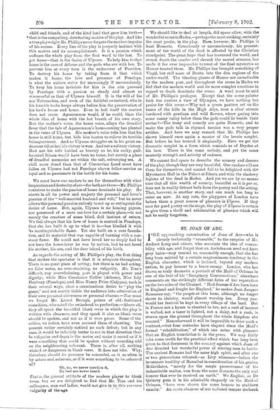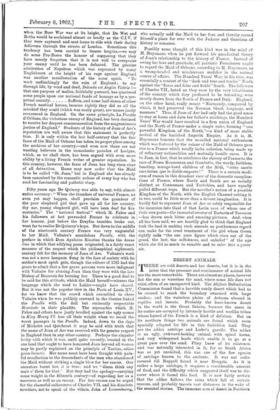ST. JOAN OP ARC.
THE approaching canonisation of Joan of Arc—who is already technically "venerable," to the surprise of Mr. Andrew Lang and -others, who associate the idea of venera- bility with age, and forget that an Archdeacon need not have grey hairs—may remind us, seasonably enough, that she has long been sainted by a certain magnanimous tendency in the English character, which is inclined, beyond any modern nation, to pay honour to a brave enemy. Landor, who has drawn so truly dramatic a portrait of the Maid of Orleans in one of the best of his "Imaginary Conversations," elsewhere comments on the strikingly different fates of her reputation on the two sides of the Channel. "Had Jeanne d'Arc been born in England and fought for England," he makes Jean Jacques Rousseau say, "the people at this hour, although no longer slaves to idolatry, would almost worship her. Every year -would her festival be kept in every village of the land. But in France not a hymn is chanted to her, not a curl of incense is wafted, not a taper is lighted, not a daisy, not a rush, is strewn upon the ground throughout the whole kingdom she rescued." Henceforward it will be impossible to draw such a contrast—but four centuries have elapsed since the Maid's formal "rehabilitation," of which one notes with pleasure that an English translation is in the press. We may fairly take some credit for the practical effect which has long been given to that document in the country against which Joan of Are directed her wonderful power of stirring men to battle. The ancient Romans had the same high spirit, and after one or two generations relented—as Livy witnesses—before the inveterate hostility of Hannibal inconsideration of his genius. Mitlnidates, "merely for the magic perseverance of his indomitable malice, won from the same Romans the only real honour that ever he received on earth." We English, as .De Quincey puts it in his admirahle rhapsody on the Maid of Orleans, "bare -ever shown the same- honour to stubborn enmity." An acute obeerver of our national temper declaeeni. when the Boer War was at its height, that De Wet and Botha would be acclaimed almost as loudly as the. C.I.V. if they were captured and sent home to ride with their daring followers through the streets of London. Sometimes this tendency has been carried to insane lengths,—we may do some Pro-Boers the honour of supposing that they have merely forgotten that it is not well to overpraise your enemy until he has been defeated. The genuine admiration of Napoleon which was expressed by many Englishmen at the height of his rage against England was another manifestation of the same spirit. "To work unflinchingly for the ruin of England ; to say through life, by word and deed, Delenda est Anglia Victriz !- that one purpose of malice, faithfully pursued, has quartered some people upon our national funds of homage as by a per- petual annuity Suffren, and some half-dozen of other French nautical heroes, because rightly they did us all the mischief they could (which was really great), are names justly reverenced in England. On the same principle, La Pucelle d'Orleans, the victorious enemy of England, has been destined to receive her deepest commemoration from the magnanimous justice of England." Students of the history of Joan of Arc's reputation are well aware that this statement is perfectly true. It is only within the last half-century that the fair fame of the Maid of Orleans has taken its proper place among the archives of her country,—and even now there are not wanting believers in the iconoclastic paradox of Lesigne, which, as we shall show, has been argued with even more ability by a living French writer of greater reputation. In this country, however, the fame of Joan has long risen clear of all detraction. Rome may now order that the Maid is to be called "St. Joan," but in England she has already been canonised by the romantic ardour of every boy who has read her fascinating and pathetic story.
Fifty years ago De Quineey was able to say, with almost entire accuracy : "When the thunders of universal France, as even yet may happen, shall proclaim the grandeur of the poor shepherd girl that gave up all for her country, thy ear, young shepherd girl, will have been deaf for five centuries." The "national festival" which M. Fabre and his followers at last persuaded France to celebrate in her honour, just before the Dreyfus troubles broke out, went far to realise De Quincey's hope. But down to the middle of the nineteenth century France was very ungrateful to her Maid. Voltaire's scandalous Pucelle, with the preface in which Dom Apuleius Risorius thanks the bonne dme in which that edifying poem originated, is a fairly exact measure of the respect which the philosophical eighteenth century felt for the memory of Joan of Arc. Voltaire's work was not a mere lampoon flung in the face of society with its author's most apish grin, though the editors of 1785 had the grace to admit that a few grave persons were more indignant with Voltaire for abusing Joan than they were with the late Bishop of Beauvais for burning her. There is a good deal to be said for this attitude, which the Maid herself—witness the language which she used to Lahire--might have shared. But it was not the popular view in the Paris of Louis XV., for we kaow that the crowd which assembled to cheer Voltaire when he was publicly crowned in the theatre linked the Pacelle with the dull but eminently respectable Henriade in their plaudits. The reproaches which M. Fabre and others have justly levelled against the ugly scenes in King Henry V1". lose all their weight when we recall the worst passages in the Pucelle. Indeed, down to the days of Michelet and Quicherat it may be said with truth that the name of Joan of Arc was received with far greater respect in England than in any other country. Perhaps the singular levity with which it was, until quite recently, treated in the one land that ought to have honoured Joan beyond all women may be partly explained on the principle of Tacitus, odisse guenslaeseris. Her name must have been fraught with pain- ful recollection to the descendants of the men who abandoned the Maid without striking a single blow for her rescue. Our ancestors burnt her, it is true : and we " dinna think ony mair o' them for that." But they had the apology—carrying some weight in the fifteenth century—of regarding her as a sorceress as well as an enemy. Far less excuse can be urged for the shameful callousness of Charles VII. and his dissolute courtiers, not to speak of the villain, John of Luxembourg,
who actually sold the Maid to her foes, and thereby earned himself a place for ever with the Judases and Ganelons of history or romance.
; Possibly some thought of this kind was in the mind of M. Huysmans when he put forward his paradoxical theory of Joan's relationship to the history of France. Instead of owing her love and gratitude, all patriotic Frenchmen ought to regard the Maid of Orleans, according to M. Huysmans, as a wrong-headed and mischievous meddler in the natural course of affairs. The Hundred Years' War, in his view, was essentially a contest of the "dark and true and tender" North against the "fierce and false and fickle" South. The followers of Charles VII., hated as they were by the very inhabitants of the country which they professed to be defending, were mostly drawn from the South of France and Italy. England, on the other hand, really meant "Normandy, conquered by which, it had preserved the Norman blood, language, and manners." Thus, if Joan of Arc had only had the good sense to stay at home and darn her father's stockings, the Hundred Years' War would have resulted in a firm union of England and the North of France under a single ruler, forming "one powerful Kingdom of the North,"—a kind of more stable revival of the banished Angevin Empire. As it is, M. Huysmans laments that the so-called national enthusiasm which was fostered by the valour of the Maid of Orleans gave rise to a France which totally lacks cohesion, being made up of refractory nationalities and mutually hostile races. It is to Joan, in fact, that he attributes the slavery of France to the race of Numa Roumestan and Gambetta, the wordy, faithless, boasting, mirage-hued children of the Midi, " cette sacr6e race latine, que le diable emporte ! " There is a certain modi- cum of reason in this decadent view of the domestic complica- tions of France, where North and South are as racially distinct as Connemara and Yorkshire, and have equally pulled different ways. But the novelist's notion of a poesible Kingdom of the North, with the English Channel cutting it in two, could be little more than a devout imagination. It is hardly fair to represent Joan of Arc as solely responsible for the incursion into Gaul of that Latin race of whom one of their own poets—the immortal creator of Tartarin of Tarascon —has drawn such bitter and amusing pictures. And, when all has been said, we are heartily glad to think that England took the lead in making such amends as posthumous regard can make for the cruel treatment of the girl whom Green rightly calla "the one mire figure which rises out of the greed, the lust, the selfishness, and unbelief" of the age which she did so much to ennoble and to raise into a purer air.











































 Previous page
Previous page